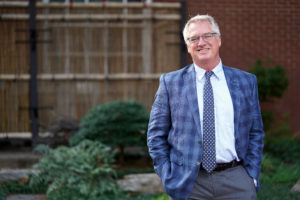
College of Education Dean Pete Kelly
The University of Mary Washington received a $14,200 planning grant from the Virginia Department of Education to work with local school divisions to develop a teacher apprenticeship program.
The VDOE on Monday announced that it awarded a total of $143,000 to nine universities across the state to develop the programs, which would allow school divisions to hire classroom aides, paraprofessionals, long-term substitutes and other unlicensed school employees as teacher apprentices, paving the way for them to become licensed educators.
A year ago, the U.S. Department of Labor approved K–12 teaching as an “apprenticeable” occupation, qualifying teacher apprentice programs for funding through several federal workforce-development grants.
In January, Tennessee became the first state to be approved by the Department of Labor to establish a permanent teacher apprenticeship program. Tennessee’s “Grow Your Own” program is a collaboration between Austin Peay State University and Clarksville-Montgomery County schools.
The program has been successful because it removes the financial burden of enrolling in a traditional teacher education program, making the profession more accessible to low-income and minority adults, said Peter Kelly, dean of UMW’s College of Education.
“They’ve been doing at least some measure of the job already,” he said. “Part of the idea is that teachers are also rooted to place, and so I think people see it as an effective ‘grow your own’ program.”
Kelly said UMW is working with Stafford, Spotsylvania and Fredericksburg public schools to determine the level of need for a local apprenticeship program.
“[The divisions] are primarily focusing on long-term substitutes and paraprofessionals, especially at the elementary level and in special education,” he said. Read more.